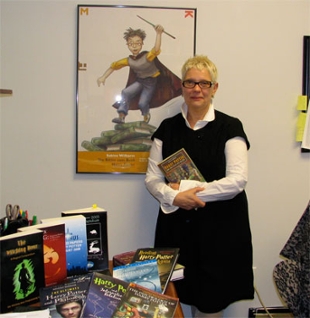Harry Potter and the Muggle Scholars
JMU News
Rumors of the death of Harry Potter in the hallowed halls of academia are greatly exaggerated. Indeed J.K. Rowling's "the boy who lived" is alive and well, and poised to take center stage at James Madison University next month.
The release of the final novel in the blockbuster adventure series in 2007 — along with part two of the movie version this past summer — has done little to quell scholarly interest in Rowling's literary saga from a broad range of disciplines, including education, religion, philosophy and law.
With the upcoming conference "Replacing Wands with Quills: A Harry Potter Symposium for Muggle Scholars," the School of Writing, Rhetoric and Technical Communication at JMU is throwing its wizard hat into the ring. The event, slated for Nov. 10-12, invites fans of all ages and interests to join visiting scholars, JMU faculty and students in exploring, examining and explaining their attraction to all things Harry Potter. John Granger, whom "Time" magazine has dubbed the "dean of Harry Potter scholars," will give the keynote address on Friday, Nov. 11.
Young people today have grown up with the series, both in print and on the big screen. "It's the defining text of the millennial generation," says symposium organizer Dr. Elisabeth Gumnior, an associate professor of writing, rhetoric and technical communication who has taught entire courses on Harry Potter. During a recent May session class, "all of my students except one had read all of the books multiple times," she says.
The popularity of Harry Potter can be attributed in part to the fact that it is written for a generation of readers who came of age in the aftermath of 9/11 with a broad world view and a clear sense of conflict, yet who embrace shadings of morality, Gumnior says. "Harry Potter expands the clich… between good and evil. The characters in the series grow and change, and students I think can relate to those complexities."
"Harry Potter was unlike any book series that I had ever read before," recalls Matt May, a first-year graduate student in WRTC who is helping organize the symposium. "The main characters were kids who were my age, and it also included magic, which was something that I had never read about in books before, and that intrigued me." Likewise, WRTC graduate student Stephen Jones of Yorktown, Va., was hooked on Harry Potter from an early age. "Ever since my sixth-grade English teacher started to read it to me and my classmates, I have been involved with the story of ‘the boy who lived.'"
Gumnior started teaching courses on Harry Potter in 2004, focusing not on the books themselves, but on the scholarly literature that has been written about them. The field has grown exponentially over the past decade, from John Granger's "Looking for God in Harry Potter" in response to religious criticism of the series, to emerging social science perspectives, to academic fan forums designed to make Harry Potter more accessible to the average reader. "My classes have changed as the availability of secondary literature has changed," Gumnior says. "Now I can bring in disciplines other than purely academic. That has really changed the conversation and given students more options on how they can contribute to discussions."
Harry Potter offers fertile ground for academic study because the world that Rowling creates is so richly detailed, drawing on elements of classical mythology and literary traditions, says WRTC assistant professor Dr. Jennifer Jacovitch. On the surface, the series revolves around education and learning: The seven books follow the progression of Harry and his mates during their seven years of study at the Hogwarts School of Witchcraft and Wizardry. But the overarching storyline — the return of the evil Lord Voldemort and his plan to conquer the wizarding world and enslave nonmagical people, known as "muggles" — also touches on the themes of love, prejudice, morality and, ultimately, death.
Scholars over the years have assigned additional layers of meaning to the text, from its treatment of gender, race and class; to discussions of genre; to the role of mass media in shaping the global Harry Potter phenomenon; to its potential real-world applications in education, therapy, medicine and law.
The symposium at JMU presents an opportunity for muggle scholars of all stripes to learn from each other, Gumnior says. Nearly 30 presenters, some from as far away as Scotland and Pakistan via Skype, have signed on to participate.
Gumnior, who is working on a quantitative analysis of secondary literature on Harry Potter, hopes the conference will be enlightening for fans and help lay the groundwork for future symposia at JMU. "After all, for us muggle scholars, magic happens when we make knowledge and meaning."
On crisp fall afternoons, Godwin and Hillside fields on the campus of James Madison University are magically transformed from mortal patches of green into bewitching battlegrounds.
More than two dozen JMU students have banded together to compete in a grounded version of the high-flying Harry Potter sport Quidditch. Author J.K. Rowling’s creation, a mainstay at Potter fan conferences around the world, has taken hold on college campuses, where students versed in the popular adventure series have formed their own teams, leagues and associations. —Read more.
Related Links:

